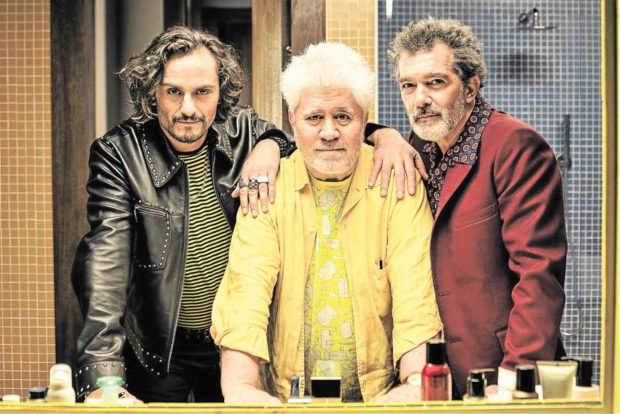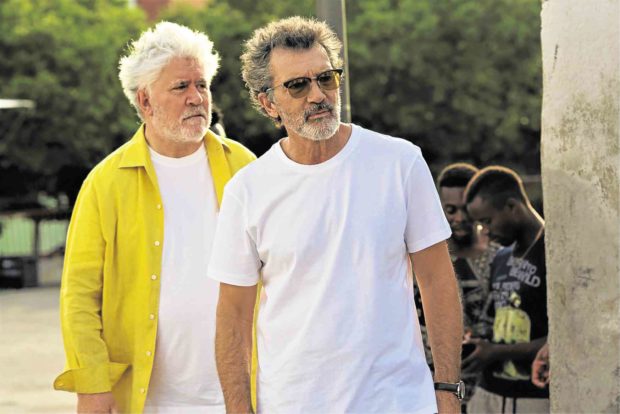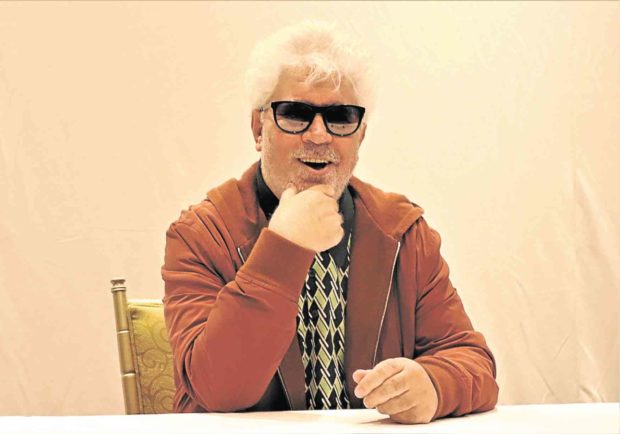At 70, Pedro Almodovar reflects on his life, career and loves

From left: Asier Etxeaandia, Almodovar and Antonio Banderas in “Pain & Glory” —PHOTOS COURTESY OF SONY PICTURES CLASSICS
LOS ANGELES—Turning 70 last Sept. 25, Pedro Almodovar has made a movie, “Pain & Glory,” that he claims is not autobiographical.
But the renowned filmmaker admits that the film is deeply personal, and the life of Antonio Banderas’ aging director character parallels his own.
Antonio won the best actor prize in the Cannes Film Festival for his portrayal of Salvador Mallo who, like Pedro, is gay, a Spanish filmmaker suffering from chronic back pain.
For “Pain & Glory,” which is Spain’s entry in the 2020 Oscars, Pedro gathered a fine cast, several of whom are regulars in his films: Antonio, Penelope Cruz, Asier Exteandia, Leonardo Sbaraglia, Julieta Serrano and Nora Navas.
The acclaimed movie follows Salvador from his childhood in the ’60s, his first desire, his first adult love to his career as a director and the void that he experiences later in life.
Article continues after this advertisementThe emotionally potent story of memories and what-might-have-beens inspired our talk about Pedro’s own life, loves and career.
Article continues after this advertisementAn interpreter sat beside Spain’s leading director, but he often spoke in English.
Excerpts from our interview with Pedro:
You turned 70 this month. Do you have any regrets? I never think about regrets.
Why did you decide to make “Pain & Glory,” which contains some elements that parallel your own life now? I couldn’t make it before because time is very important in the movie. You show part of the contemporary moment, but also the ’80s, a decade that saved me as a person. And also the early ’60s when I was a child.
It is also the result of getting older. I don’t think of myself like a nice old person. There are some moments of the day that I think, like Philip Roth says, that just to get old is not a sickness but a massacre.
But I still hope that I learn to do many things. When I started making movies, I didn’t know anything about the language. Now in the last two years, I started doing photographs and paintings. Learning new things as I get older, I enjoy that.
In “Pain & Glory,” you are telling a very personal story. Some people think Antonio is playing you. Yeah, this is what everybody says.
So how much of you is in Antonio’s director? It is obvious that I took myself as reference for the main character. I’m projected in the whole movie, but not in a complete literal way.
Let’s say that I took a lot from myself. But I also mined the memories of my brother, sisters and friends during the ’80s, things that happened to people who were very close to me.
When you write, there is a quick moment when fiction comes in.
How intense were your feelings when you were young? Did you faint at the sight of a nude man, as in the film? No, I did not faint. I wanted to express how strong is that feeling in the boy.
Desire was very present in my life, even when I didn’t know that it was that word. I discovered that feeling, that impulse at the same age (as the boy in the film), 9 or 10 years old, when I was in school.
When you were writing the script, did it somehow make you recall your past, including the loves in your life? Yeah, it was reliving in a way. The memories of the ’80s, some of them were very close to me. I mean, the love part, it is very close to me.
The other part, for example, the things related to drugs, they were around me, but I didn’t experiment with those.
But I had the experience of having been in love with someone, desperately in love. It was not reciprocated.
I didn’t have a chance to revisit a past relationship like Antonio’s character did. During the writing, the moment that I was really moved was the one when the two lovers see each other again. That was complete fiction, but I was very involved in that situation.
Also, everything related with my mother. As I said before, it was not exactly what happened to me, but the presence of my mother was very strong. And sometimes, I cried during the writing.
Antonio talked about a period when you didn’t work together. Then, when you worked together again, he had different ideas about the work. I suppose that he was thinking about the shooting of “The Skin I Live In.”
It is true that at that moment, he had different ideas of the character from mine. Anyway, we discussed it.
Antonio is a very generous, talented actor, so we did have those conversations. But the conversations never got heated.
It was merely a discussion of differences in opinion on what was expected. But he’s a very cooperative actor, so he followed my cues.
Sometimes, creating art can be a lonely or painful experience. Do you experience that? I don’t know if it is a pain exactly. What I remember is that when I started making movies almost 40 years ago, I enjoyed much more the shooting, giving life to a fantasy that I have at my home when I was writing. With time, I was suffering more and more.
But the pain I may feel when I’m working … [is] not the kind of pain that leaves you wounded or scarred.
It’s admirable that you do not make Hollywood movies. What are your reasons? Precisely after the release of “Women on the Verge of a Nervous Breakdown,” I was old enough to know what my ambition was as a filmmaker.
I’m a big admirer of the movies of Hollywood, and the stars, but I didn’t dream to make a big-budget movie. I dreamed I would make my own movies in complete freedom and independence.
And the best place to do it was in Madrid, or at least in Spain. And also because the projects that they proposed me to do, they were not very attractive to me. It doesn’t mean that I will never do a movie in English.
But if the story needs to be said in English, it will be in English. But there was a project that I considered for three months. They (producers) were waiting for me. It was “Brokeback Mountain.” Because I knew Annie Proulx’s story. I was really hooked by that story.
Larry McMurtry was not only the writer, but also the producer. He promised me artistic freedom. It doesn’t mean that I didn’t trust Larry. But in talking to other directors, I thought that the Hollywood production system doesn’t fit me. So that’s why I refused it.
What I see in a Hollywood production is that the director is really one more technician. So there are opinions that are even more important than his. That situation doesn’t fit me.
“Brokeback Mountain” was ultimately made by Ang Lee. What do you think of his version? It was beautifully done. I loved the movie. But I think about the story of Annie Proulx. It was much more physical. I mean, excuse me for my words, they (the two lead characters) f**k like animals.
There was much more in the story than it appears in the movie. I wanted to include some more sequences of lovemaking, because it was very physical.
Anyway, Ang Lee did precisely what was enough for the audience to understand the story. But in my case, I would demand much more sex scenes. And I don’t think they will allow me to do it.
E-mail [email protected]. Follow him at https://twitter.com/nepalesruben.

